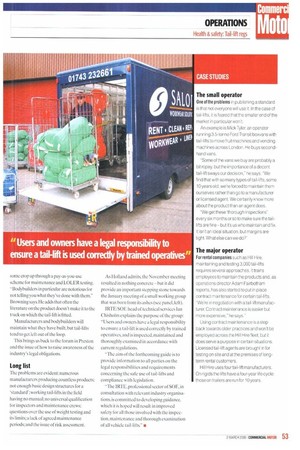CASE STUDIES
Page 53

If you've noticed an error in this article please click here to report it so we can fix it.
The small operator
One of the problems in publishing a standard is that not everyone will use it. In the case of tail-lifts, it is feared that the smaller end of the market in particular won't.
An example is Mick Tyler, an operator running 3.5-tonne Ford Transit boxvans with tail-lifts to move fruit machines and vending machines across London. He buys secondhand vans.
Some of the vans we buy are probably a bit ropey, but the importance of a decent tail-lift sways our decision," he says. "We find that with so many types of tail-lifts, some 10 years old, we're forced to maintain them ourselves rather than go to a manufacturer or licensed agent. We certainly know more about the product than an agent does.
"We get these 'thorough inspections' every six months or so to make sure the taillifts are fine — but ifs us who maintain and fix. It isn't an ideal situation, but margins are tight. What else can we do?"
The major operator
For rental companies such as Hill Hire, maintaining and testing 3,000 tail-lifts requires several approaches. It trains employees to maintain the products and, as operations director Adam Fairbotham reports, has also started to put in place contract maintenance for certain tail-lifts. "We're in negotiation with a tail-lift manufacturer. Contract maintenance is easier but more expensive," he says."
Using contract maintenance is a step back towards older practices and won't be employed across the Hill Hire fleet, but it does serve a purpose in certain situations. Licensed tail-lift agents are brought in for testing on site and at the premises of longterm rental customers.
Hill Hire uses four tail-lift manufacturers. On rigids the lifts have a four-year life cycle: those on trailers are run for 10 years.
















































































































































































































